形容词转换为副词的规律
- 格式:docx
- 大小:12.70 KB
- 文档页数:1
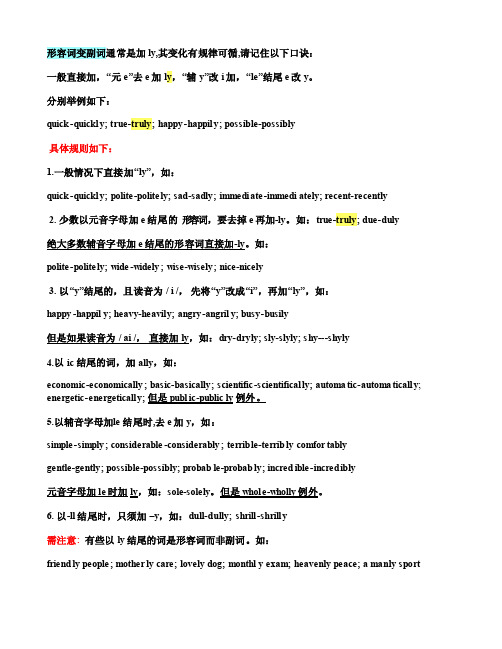
形容词变副词通常是加ly,其变化有规律可循,请记住以下口诀:一般直接加,“元e”去e加ly,“辅y”改i加,“le”结尾e改y。
分别举例如下:quick-quickly; true-truly;happy-happily; possibl e-possibl y具体规则如下:1.一般情况下直接加“ly”,如:quick-quickly;polite-politel y;sad-sadly;immedia te-immedia tely;recent-recentl y2.少数以元音字母加e结尾的形容词,要去掉e再加-ly。
如:true-truly; due-duly绝大多数辅音字母加e结尾的形容词直接加-ly。
如:polite-politel y;wide-widely;wise-wisely; nice-nicely3.以“y”结尾的,且读音为/ i /,先将“y”改成“i”,再加“ly”,如:happy-happily;heavy-heavily;angry-angrily;busy-busily但是如果读音为/ ai /,直接加ly,如:dry-dryly; sly-slyly;shy---shyly4.以ic结尾的词,加ally,如:economi c-economi cally;basic-basical ly;scienti fic-scienti ficall y;automat ic-automat ically; energet ic-energet ically; 但是publi c-publicl y例外。
5.以辅音字母加l e结尾时,去e加y,如:simple-simply;conside rable-conside rably;terribl e-terribl y comfort ablygentle-gently;possibl e-possibl y;probabl e-probabl y; incredi ble-incredi bly元音字母加le时加ly,如:sole-solely。
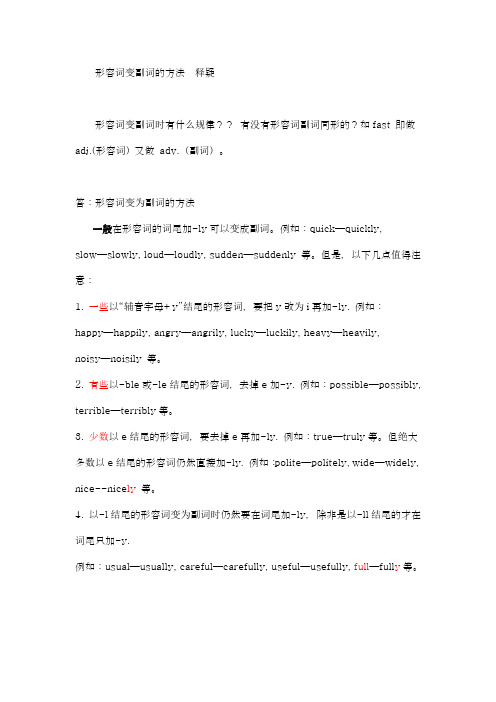
形容词变副词的方法释疑形容词变副词时有什么规律??有没有形容词副词同形的?如fast 即做adj.(形容词) 又做adv.(副词)。
答:形容词变为副词的方法一般在形容词的词尾加-ly可以变成副词。
例如:quick—quickly, slow—slowly, loud—loudly, sudden—suddenly 等。
但是,以下几点值得注意:1. 一些以“辅音字母+y”结尾的形容词,要把y改为i再加-ly. 例如:happy—happily, angry—angrily, lucky—luckily, heavy—heavily, noisy—noisily 等。
2.有些以-ble或-le结尾的形容词,去掉e加-y. 例如:possible—possibly, terrible—terribly等。
3. 少数以e结尾的形容词,要去掉e再加-ly. 例如:true—truly等。
但绝大多数以e结尾的形容词仍然直接加-ly. 例如:polite—politely, wide—widely,nice--nice ly等。
4. 以-l结尾的形容词变为副词时仍然要在词尾加-ly,除非是以-ll结尾的才在词尾只加-y.例如:usual—usually, careful—carefully, useful—usefully, full—full y等。
同形的副词和形容词fast train 快车hard workers 干活卖力的工人run fast 跑得快work hard 干活卖力,工作努力right answer 正确的回答enough food 足够的食物do everything right 样样事情做得对large enough 足够大in the late afternoon 傍晚in the early morning 一大早work late 工作得晚come early 来得早其他如straight, wide, high, low也都能用作形容词和副词。

一、形容词变副词规律及特殊情况1.一般直接加lycareless-carelesslyconfident-confidentlyfortunate-fortunately2.以le结尾的形容词去e加yterrible-terriblypossible-possiblycomfortable-comfortablygentle-gently3.其他以e结尾的形容词直接加lywise-wiselynice-nicelyentire-entirelyabsolute-absolutely4.以辅音字母+y结尾的,变y为i+lyhappy-happilyeasy-easilyangry-angrilymerry-merrily5.以ic结尾的+allyspecific-specificallybasic-basicallyscientific-scientifically6.adj和adv同形fast-fastearly-earlyhard-hardlate-latefar-faralone-alonelittle-little7.有两个副词形式的词high-high/highlydeep-deep/deeplyhard-hard/hardlyclose-close/closelywide-wide/widelyloud-loud/loudlylate-late/lately有无ly意义大不相同的副词:⎩⎨⎧dead 完全,绝对 be dead asleep deadly 非常 be deadly tired ⎩⎨⎧pretty 相当 be pretty certain that...prettily 漂亮地 be prettily dressed⎩⎨⎧close 近 Don't sit close.closely 密切地 Watch closely ! ⎩⎨⎧late 晚,迟 arrive late lately 最近 I haven't seen him lately. ⎩⎨⎧hard 努力地 I study hard.hardly 几乎不 I could hardly recognize her. 8. 特殊true -trulywhole -whollyfull -fullydull -dullypublic -publiclyshy →shyly9. 以ly 结尾的adj.friendly lovely lonely sillydeadly lively(生动的,活泼点)manly womanly elderlybrotherly fatherly motherlydaily weekly monthly yearly二、副词的句法功能修饰动词→He studies hard.修饰形容词→He is very smart.修饰副词→He does very well in English.修饰句子→Obviously, your answer is absolutely wrong.(频率副词常放在be动词、助动词、情态动词之后,行为动词之前I have never seen him before. He usually reads books.)三、构成形容词的常见后缀1.名词+ysun- sunnyfun- funnyrain- rainyflower- flowery(花香的)2.动词+ableadvise- advisable(可取的,明智的)comfort- comfortable3.名词+alnation- nationaleducation- educationalnature- natural(天然的)4.名词+enwood- wooden(木制的)gold- golden(金色的)5.动词+entdiffer- differentinsist- insistent(坚持的)6.名词+ishfool- foolishself- selfishchild- childish(孩子气的的)7.动词+iveact- activeimpress- impressive8.名词+fulpower- powerfulpeace- peacefulbeauty- beautifulwonder- wonderful9.名词+ousdanger- dangerouscourage- courageous(勇敢的)fame- famousenvy- envious(羡慕的,嫉妒的)10.名词+lyfriend- friendlytime- timely(及时的)order- orderly(有秩序的)day- daily(每天的)week-weeklymonth-monthlyyear-yearly四、形容词和副词变比较级和最高级规则1.一般+er/eststrong- stronger- strongest2.以字母e结尾只加r/stlate- later- latest以一个辅音字母结尾的重读闭音节词,双写这一个辅音字母后再加er/est 闭音节:a)辅音+元音+辅音例如:bad,bed,sit,hot,cup;b)元音+辅音例如it、of; c) 元音+多个辅音例如:egg ,fish 。
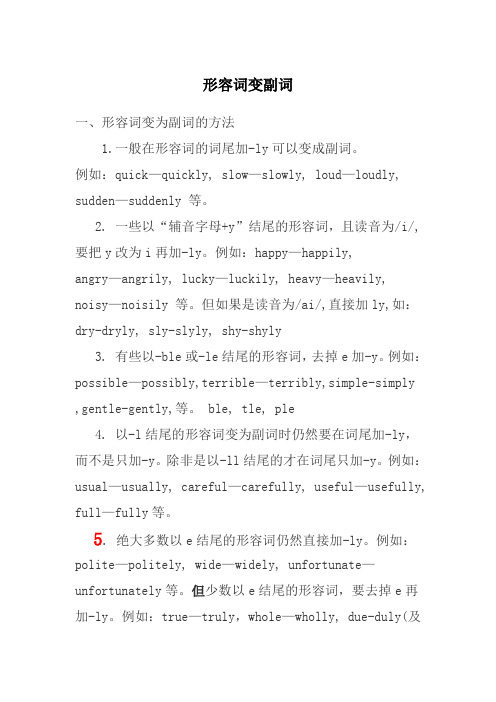
形容词变副词一、形容词变为副词的方法1.一般在形容词的词尾加-ly可以变成副词。
例如:quick—quickly, slow—slowly, loud—loudly, sudden—suddenly 等。
2. 一些以“辅音字母+y”结尾的形容词,且读音为/i/,要把y改为i再加-ly。
例如:happy—happily, angry—angrily, lucky—luckily, heavy—heavily, noisy—noisily 等。
但如果是读音为/ai/,直接加ly,如:dry-dryly, sly-slyly, shy-shyly3. 有些以-ble或-le结尾的形容词,去掉e加-y。
例如:possible—possibly,terrible—terribly,simple-simply,gentle-gently,等。
ble, tle, ple4. 以-l结尾的形容词变为副词时仍然要在词尾加-ly,而不是只加-y。
除非是以-ll结尾的才在词尾只加-y。
例如:usual—usually, careful—carefully, useful—usefully, full—fully等。
5. 绝大多数以e结尾的形容词仍然直接加-ly。
例如:polite—politely, wide—widely, unfortunate—unfortunately等。
但少数以e结尾的形容词,要去掉e再加-ly。
例如:true—truly,whole—wholly, due-duly(及时)等。
6.以ic结尾的加allyEnergetic-energeticallyAutomatic-automaticallyScientific-scientificallyEconomic-economicallyBasic-basically Public-publicly(例外)注意:1.不是所有的以-ly结尾的词都是副词。
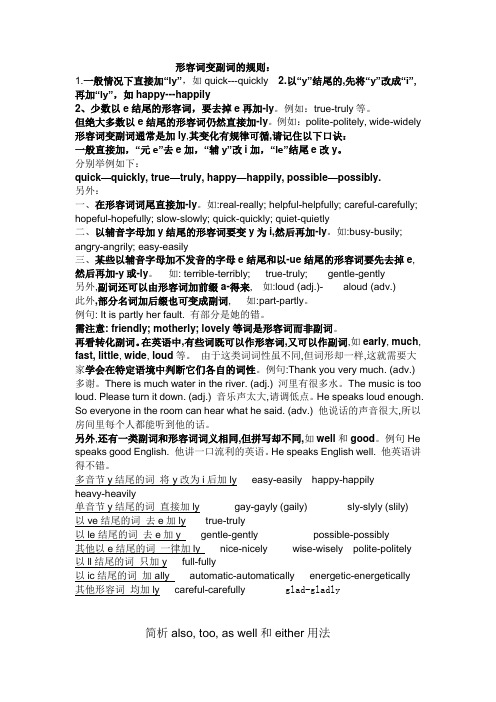
形容词变副词的规则:1.一般情况下直接加“ly”,如quick---quickly2.以“y”结尾的,先将“y”改成“i”,再加“ly”,如happy---happily2、少数以e结尾的形容词,要去掉e再加-ly。
例如:true-truly等。
但绝大多数以e结尾的形容词仍然直接加-ly。
例如:polite-politely, wide-widely 形容词变副词通常是加ly,其变化有规律可循,请记住以下口诀:一般直接加,“元e”去e加,“辅y”改i加,“le”结尾e改y。
分别举例如下:quick—quickly, true—truly, happy—happily, possible—possibly.另外:一、在形容词词尾直接加-ly。
如:real-really; helpful-helpfully; careful-carefully; hopeful-hopefully; slow-slowly; quick-quickly; quiet-quietly二、以辅音字母加y结尾的形容词要变y为i,然后再加-ly。
如:busy-busily; angry-angrily; easy-easily三、某些以辅音字母加不发音的字母e结尾和以-ue结尾的形容词要先去掉e,然后再加-y或-ly。
如: terrible-terribly; true-truly; gentle-gently另外,副词还可以由形容词加前缀a-得来, 如:loud (adj.)- aloud (adv.)此外,部分名词加后缀也可变成副词, 如:part-partly。
例句: It is partly her fault. 有部分是她的错。
需注意: friendly; motherly; lovely等词是形容词而非副词。
再看转化副词。
在英语中,有些词既可以作形容词,又可以作副词,如early, much, fast, little, wide, loud等。
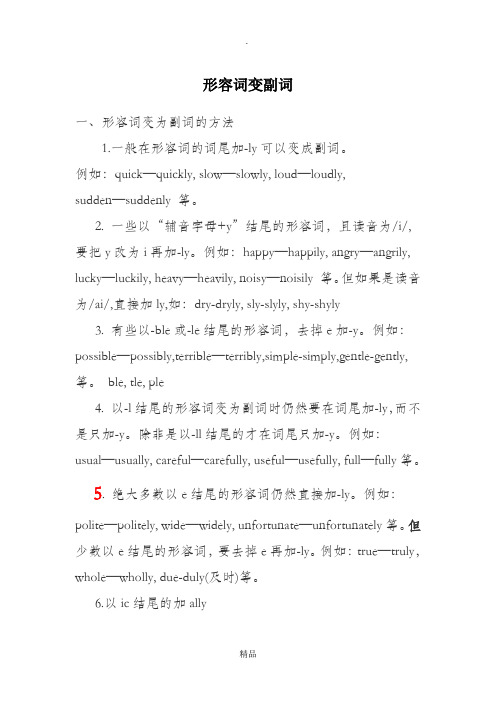
形容词变副词一、形容词变为副词的方法1.一般在形容词的词尾加-ly可以变成副词。
例如:quick—quickly, slow—slowly, loud—loudly, sudden—suddenly 等。
2. 一些以“辅音字母+y”结尾的形容词,且读音为/i/,要把y改为i再加-ly。
例如:happy—happily, angry—angrily, lucky—luckily, heavy—heavily, noisy—noisily 等。
但如果是读音为/ai/,直接加ly,如:dry-dryly, sly-slyly, shy-shyly3. 有些以-ble或-le结尾的形容词,去掉e加-y。
例如:possible—possibly,terrible—terribly,simple-simply,gentle-gently,等。
ble, tle, ple4. 以-l结尾的形容词变为副词时仍然要在词尾加-ly,而不是只加-y。
除非是以-ll结尾的才在词尾只加-y。
例如:usual—usually, careful—carefully, useful—usefully, full—fully等。
5. 绝大多数以e结尾的形容词仍然直接加-ly。
例如:polite—politely, wide—widely, unfortunate—unfortunately等。
但少数以e结尾的形容词,要去掉e再加-ly。
例如:true—truly,whole—wholly, due-duly(及时)等。
6.以ic结尾的加allyEnergetic-energetically Automatic-automaticallyScientific-scientifically Economic-economicallyBasic-basically Public-publicly(例外)注意:1.不是所有的以-ly结尾的词都是副词。
一、形容词变副词规律及特殊情况1.一般直接加lycareless-carelesslyconfident-confidentlyfortunate-fortunately2.以le结尾的形容词去e加yterrible-terriblypossible-possiblycomfortable-comfortablygentle-gently3.其他以e结尾的形容词直接加lywise-wiselynice-nicelyentire-entirelyabsolute-absolutely4.以辅音字母+y结尾的,变y为i+lyhappy-happilyeasy-easilyangry-angrilymerry-merrily5.以ic结尾的+allyspecific-specificallybasic-basicallyscientific-scientifically6.adj和adv同形fast-fastearly-earlyhard-hardlate-latefar-faralone-alonelittle-little7.有两个副词形式的词high-high/highlydeep-deep/deeplyhard-hard/hardlyclose-close/closelywide-wide/widelyloud-loud/loudlylate-late/lately有无ly意义大不相同的副词:⎩⎨⎧dead 完全,绝对 be dead asleep deadly 非常 be deadly tired ⎩⎨⎧pretty 相当 be pretty certain that...prettily 漂亮地 be prettily dressed⎩⎨⎧close 近 Don't sit close.closely 密切地 Watch closely ! ⎩⎨⎧late 晚,迟 arrive late lately 最近 I haven't seen him lately. ⎩⎨⎧hard 努力地 I study hard.hardly 几乎不 I could hardly recognize her. 8. 特殊true -trulywhole -whollyfull -fullydull -dullypublic -publiclyshy →shyly9. 以ly 结尾的adj.friendly lovely lonely sillydeadly lively(生动的,活泼点)manly womanly elderlybrotherly fatherly motherlydaily weekly monthly yearly二、副词的句法功能修饰动词→He studies hard.修饰形容词→He is very smart.修饰副词→He does very well in English.修饰句子→Obviously, your answer is absolutely wrong.(频率副词常放在be动词、助动词、情态动词之后,行为动词之前I have never seen him before. He usually reads books.)三、构成形容词的常见后缀1.名词+ysun- sunnyfun- funnyrain- rainyflower- flowery(花香的)2.动词+ableadvise- advisable(可取的,明智的)comfort- comfortable3.名词+alnation- nationaleducation- educationalnature- natural(天然的)4.名词+enwood- wooden(木制的)gold- golden(金色的)5.动词+entdiffer- differentinsist- insistent(坚持的)6.名词+ishfool- foolishself- selfishchild- childish(孩子气的的)7.动词+iveact- activeimpress- impressive8.名词+fulpower- powerfulpeace- peacefulbeauty- beautifulwonder- wonderful9.名词+ousdanger- dangerouscourage- courageous(勇敢的)fame- famousenvy- envious(羡慕的,嫉妒的)10.名词+lyfriend- friendlytime- timely(及时的)order- orderly(有秩序的)day- daily(每天的)week-weeklymonth-monthlyyear-yearly四、形容词和副词变比较级和最高级规则1.一般+er/eststrong- stronger- strongest2.以字母e结尾只加r/stlate- later- latest以一个辅音字母结尾的重读闭音节词,双写这一个辅音字母后再加er/est 闭音节:a)辅音+元音+辅音例如:bad,bed,sit,hot,cup;b)元音+辅音例如it、of; c) 元音+多个辅音例如:egg ,fish 。
形容词变副词的规则:1.一般情况下直接加“ly”,如quick---quickly2.以“y”结尾的,先将“y”改成“i”,再加“ly”,如happy---happily2、少数以e结尾的形容词,要去掉e再加-ly。
例如:true-truly等。
但绝大多数以e结尾的形容词仍然直接加-ly。
例如:polite-politely, wide-widely 形容词变副词通常是加ly,其变化有规律可循,请记住以下口诀:一般直接加,“元e”去e加,“辅y”改i加,“le”结尾e改y。
分别举例如下:quick—quickly, true—truly, happy—happily, possible—possibly.另外:一、在形容词词尾直接加-ly。
如:real-really; helpful-helpfully; careful-carefully; hopeful-hopefully; slow-slowly; quick-quickly; quiet-quietly二、以辅音字母加y结尾的形容词要变y为i,然后再加-ly。
如:busy-busily; angry-angrily; easy-easily三、某些以辅音字母加不发音的字母e结尾和以-ue结尾的形容词要先去掉e,然后再加-y或-ly。
如: terrible-terribly; true-truly; gentle-gently另外,副词还可以由形容词加前缀a-得来, 如:loud (adj.)- aloud (adv.)此外,部分名词加后缀也可变成副词, 如:part-partly。
例句: It is partly her fault. 有部分是她的错。
需注意: friendly; motherly; lovely等词是形容词而非副词。
再看转化副词。
在英语中,有些词既可以作形容词,又可以作副词,如early, much, fast, little, wide, loud等。
形容词变副词规律总结(图表)已仔细核对,无错误,可放心下载1. Mrs White smiled _____ ( happy) when she received a present from her daughter.2. Why do you think you did so ___________(terribe)in your test?3. We can __________(easy) forgive a child who is afraid of the dark, but we can’t forgivean adult who is afraid of the light.4. Congratulations! Y ou’ve answered all the questions _________(correct).5. The computer is ______( wide)used in our daily life. We can do many things with it.6. I changed into my sports shoes so that I could walk more ____________(comfortabe).7. Mary passed her examination because she studied very ________( hard ).8. “Why didn’t you tell me earlier?” The boss shouted _______(angry).9. It’s ___(true) possible that robot teachers will be popular in schools some day.10. How _________(comfortable) the giant pandas are living in Taiwan!11. Miss Xu smiled and said to me ________(soft), “Never mind, my boy!”12. Last night it rained __________(heavy) in the southern part of the city.13. Simon hates to be like others, he often tires to do everything ______(different).14. ----Where is Peter from? ----He is French, if I remember _________(correct).15. The children clapped their hands _________(excited) as soon as the astronauts appeared on the stage.16. Tom had an accident yesterday. His teacher sent him to the hospital ____(quick).17. We should speak to the old man _________(polite)18. I’m _______(true) sorry I can’t go with you. I have a lot to do this afternoon.19. Nancy is patient and she doesn’t give up ________(easy).20.His father was looking _____ (angry) at him because he had made a serious mistake.21.Mike walked _______(quiet) into the room not to wake up his grandpa.22. How _______(quick) Betty answered the teacher’s question!23. The firemen have saved the boy from the fire ____________(successful).Keys: 1. happily 2.terribly 3. easily 4. correctly 5. widely 6. comfortably7. hard 8. angrily 9. truly 10. comfortably 11. softly 12. heavily 13. differently14. correctly 15. excitedly 16. quickly 17. politely 18. truly 19. easily 20. angrily 21. quietly 22. quickly 23. successfully。
形容词变副词一、形容词变为副词的方法1.一般在形容词的词尾加-ly可以变成副词。
例如:quick—quickly, slow—slowly, loud—loudly, sudden—suddenly 等。
2. 一些以“辅音字母+y”结尾的形容词,且读音为/i/,要把y改为i再加-ly。
例如:happy—happily, angry—angrily, lucky—luckily, heavy—heavily, noisy—noisily 等。
但如果是读音为/ai/,直接加ly,如:dry-dryly, sly-slyly, shy-shyly3. 有些以-ble或-le结尾的形容词,去掉e加-y。
例如:possible—possibly,terrible—terribly,simple-simply,gentle-gently,等。
ble, tle, ple4. 以-l结尾的形容词变为副词时仍然要在词尾加-ly,而不是只加-y。
除非是以-ll结尾的才在词尾只加-y。
例如:usual—usually, careful—carefully, useful—usefully, full—fully等。
5. 绝大多数以e结尾的形容词仍然直接加-ly。
例如:polite—politely, wide—widely, unfortunate—unfortunately等。
但少数以e结尾的形容词,要去掉e再加-ly。
例如:true—truly,whole—wholly, due-duly(及时)等。
6.以ic结尾的加allyEnergetic-energeticallyAutomatic-automaticallyScientific-scientificallyEconomic-economicallyBasic-basically Public-publicly(例外)注意:1.不是所有的以-ly结尾的词都是副词。